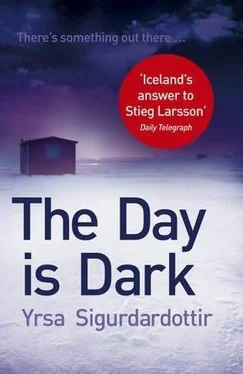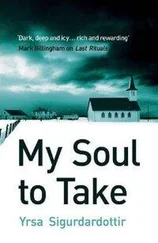Yrsa Sigurdardóttir - The Day Is Dark
Здесь есть возможность читать онлайн «Yrsa Sigurdardóttir - The Day Is Dark» весь текст электронной книги совершенно бесплатно (целиком полную версию без сокращений). В некоторых случаях можно слушать аудио, скачать через торрент в формате fb2 и присутствует краткое содержание. Жанр: Детектив, на английском языке. Описание произведения, (предисловие) а так же отзывы посетителей доступны на портале библиотеки ЛибКат.
- Название:The Day Is Dark
- Автор:
- Жанр:
- Год:неизвестен
- ISBN:нет данных
- Рейтинг книги:5 / 5. Голосов: 1
-
Избранное:Добавить в избранное
- Отзывы:
-
Ваша оценка:
- 100
- 1
- 2
- 3
- 4
- 5
The Day Is Dark: краткое содержание, описание и аннотация
Предлагаем к чтению аннотацию, описание, краткое содержание или предисловие (зависит от того, что написал сам автор книги «The Day Is Dark»). Если вы не нашли необходимую информацию о книге — напишите в комментариях, мы постараемся отыскать её.
Already an international bestseller, this fourth book to feature Thóra Gudmundsdóttir ('a delight' – Guardian) is chilling, unsettling and compulsively readable.
The Day Is Dark — читать онлайн бесплатно полную книгу (весь текст) целиком
Ниже представлен текст книги, разбитый по страницам. Система сохранения места последней прочитанной страницы, позволяет с удобством читать онлайн бесплатно книгу «The Day Is Dark», без необходимости каждый раз заново искать на чём Вы остановились. Поставьте закладку, и сможете в любой момент перейти на страницу, на которой закончили чтение.
Интервал:
Закладка:
Unlike his dogs, who were never in doubt as to how to react to new circumstances, Igimaq was stumped. What should he do? This is what happened when you trusted others. When he had first heard of the plans for the mine, his friend Sikki had promised him that the prohibited area would only be driven over – no work would be carried out there. Igimaq had believed him, despite the old familiar look in his eyes that suggested he was not telling the truth. When the camp started to be built on the outskirts of the area he had spoken again to Sikki and again been promised that it would be all right; he would tell those who came that they should not wander any further north, but instead keep themselves south of the camp. Again he had seen that look – nevertheless, Igimaq had chosen to believe what Sikki said rather than what his own eyes told him. Now the story had repeated itself a third time and although Igimaq should not have let himself be fooled, it was too late. There would be no turning back.
Had Igimaq dealt with this the first time he was lied to, things might have turned out differently. But just like his countrymen of the same generation, it simply ran contrary to his character and upbringing to argue or get worked up. It was an ancient custom; those who lived together in small groups could not afford discord, meaning that those who raised their voices or bickered with each other were looked down on. The only way to express one’s disapproval was to remain silent, because words spoken in anger had a way of snowballing, intensifying and provoking hostility that would eventually put the survival of the entire community at risk. The Greenlandic language was thus free of invective and Igimaq was not about to start swearing in Danish. He should have pushed the issue with Sikki, forced him to explain how he intended to keep the workers out of the area, even though such a discussion would have been against his upbringing.
He had also been taught to have immeasurable respect for his ancestors, and from them he had inherited the responsibility of keeping the area free of human activity. He and Sikki, his old friend. And now they had both failed. Igimaq could not lay all the blame on Sikki.
He tried to imagine what would happen next. He knew little about the police, since they were seldom seen in these parts. Through the years various things had happened that the police would undoubtedly have wanted to investigate, but the villagers were better suited to dealing with their own problems, evaluating them and determining guilt and innocence. And, most importantly, deciding on punishment for the guilty. More often than not it was enough for the offender to live with the shame of having done wrong, but Igimaq remembered one instance from his youth when a man who had murdered his son in a brutal manner and showed no remorse had been exiled from the area. News of him reached the village intermittently and it was always in the same vein: he was thrown out of one settlement after another when people found out who he was. Finally no further news came of him and people said that he had died alone out in the wilderness. The police would never have dealt with the situation like this, but this solution was the only correct one. The man had no more business being in prison than any other Greenlander. Greenlanders were not to be locked up; that was just plain wrong. Igimaq would go crazy if he were denied the chance to breathe the cold, outside air and his eyes would go blind if they were deprived of the stimulation that the endless expanse of land granted him.
No, the police had no business here, even though the fact that four of them appeared to be his countrymen. They were doubtless more Danish than Greenlandic, probably from the west coast, and unfamiliar with the situation of the inhabitants on this side of the ice cap. None of them would understand Igimaq, or anyone else who knew the history of the place, and it was little use trying to explain it to them. They might even be the lowest form of Greenlanders: those who did not speak their own language, only Danish. Whether this was the case or not, these men would probably twist everything around and interpret it all the wrong way. It was perhaps wisest for him to leave; take his dogs and move even further north. He could easily lose them. It wouldn’t matter how hard they tried to find him; in the end they would give up. He had no trouble at all living far from any human settlement for months or even years at a time; he knew places that no one could reach except exceptionally experienced men on dogsleds. Snowmobiles were no match for these old vehicles when it came to long distances, and no one could assess situations in the same way as dogs. Igimaq himself would have ended up at the bottom of the sea long ago if he’d chosen to cross the ice on a motorized sled, because the dogs knew the ice and where it was sound. They heard cracks that the human ear could not distinguish and which could not be seen on the surface of the ice, but which were the predecessors of larger cracks that opened into the icy cold depths of the sea, and spared no one.
If he left, then he would never return; that much was clear. Igimaq had long intended to end his life in this way: pack up and travel north with his dogs and avoid human contact. He would try to see how long he could last, and suspected it would be quite a few years. As long as the dogs stayed alive he could too; once they started dying, things would look different. When he was young his grandfather had taught him that out on the ice sheets his dogs were the hunter’s lifeline. Without them he wouldn’t get across quickly enough to survive. The distances between sources of sustenance were too long for travellers on foot to make it. Igimaq had often heard the story of the Danish cartographers who ran out of food in north-east Greenland and resorted to eating their dogs. They ate them one by one and after the last dog was gone, so was all their hope, and they died out in the wilderness. Their native guide made it the farthest and the expedition’s diary was found on his body, describing the men’s hardships in detail. Igimaq’s father had once taken him to visit a friend who knew how to read and allowed him to listen to excerpts from the diary, so that he would learn from the men’s mistakes. It had worked, and now Igimaq would sooner die of starvation than think of eating his dogs.
No, he would go nowhere for the time being. He had to remain here and fulfil his obligation even though it wasn’t clear to him how he ought to go about it. He stared up at the starry sky and tried to identify the animals that he was told people in other countries saw there. He failed to see any, but suddenly realized what he could do. He would have to fetch Usinna and get her out of there. He was not the only one who had been involved in her death and it was unclear whether Sikki and Naruana would find disappearing as easy as he would. Igimaq was a man, and he did not let others pay for his actions.
Chapter 27
Outside it was dark and windy, but that didn’t matter when it was warm and cosy inside the hotel. The breakfast was particularly good, especially in comparison to the hodgepodge that they had eaten over the last few mornings. Bella was the only one who complained about the conditions. She was extremely unhappy that there were only non-smoking rooms at the hotel. ‘I mean, we’re in Greenland. We can go out and kill the first thing we see and we can probably do everything we can think of inside this hotel, except for smoking. This is fucking lunacy.’ She stood up dramatically, grabbed her black jumper and dashed outside.
‘Has anyone heard from the police?’ The doctor wiped his mouth on a white napkin and laid it over his plate. ‘Will we receive permission to leave today?’
Читать дальшеИнтервал:
Закладка:
Похожие книги на «The Day Is Dark»
Представляем Вашему вниманию похожие книги на «The Day Is Dark» списком для выбора. Мы отобрали схожую по названию и смыслу литературу в надежде предоставить читателям больше вариантов отыскать новые, интересные, ещё непрочитанные произведения.
Обсуждение, отзывы о книге «The Day Is Dark» и просто собственные мнения читателей. Оставьте ваши комментарии, напишите, что Вы думаете о произведении, его смысле или главных героях. Укажите что конкретно понравилось, а что нет, и почему Вы так считаете.












